Related Research Articles

Bandar Seri Begawan (BSB) is the capital and largest city of Brunei. It is officially a municipal area with an area of 100.36 square kilometres (38.75 sq mi) and an estimated population of 100,700 as of 2007. It is part of Brunei–Muara District, the smallest yet most populous district which is home to over 70 per cent of the country's population. It is the country's largest urban centre and nominally the country's only city. The capital is home to Brunei's seat of government, as well as a commercial and cultural centre. It was formerly known as Brunei Town until it was renamed in 1970 in honour of Omar Ali Saifuddien III, the 28th Sultan of Brunei and the father of Sultan Hassanal Bolkiah.

Mohamed Bolkiah ibni Omar Ali Saifuddien III is a member of the royal family of Brunei. He is the second son of Omar Ali Saifuddien III, the 28th Sultan of Brunei, and Raja Isteri (Queen) Pengiran Anak Damit. After Brunei's independence in 1984, he became the country’s first foreign minister, serving from 1 January 1984 until 22 October 2015, alongside the second Minister of Foreign Affairs and Trade, Lim Jock Seng.
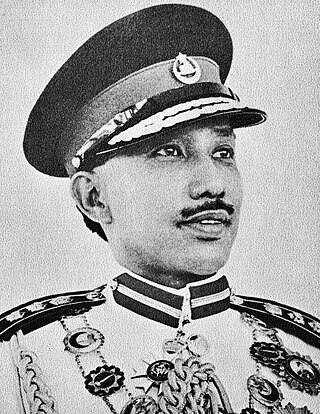
Omar Ali Saifuddien Sa'adul Khairi Waddien was the 28th Sultan of Brunei, reigning from 1950 until his abdication in 1967 to his oldest son, Hassanal Bolkiah.

Al-Muhtadee Billah ibni Hassanal Bolkiah is the eldest son of Sultan Hassanal Bolkiah and his wife Queen Saleha. He is the Crown Prince of Brunei Darussalam, and is first in the line of succession to the Bruneian throne. He will eventually lead the state and government and is regarded as the second most significant figure in the political hierarchy.

The prime minister of Brunei is the head of government of Brunei. Concurrently, the title is held by the sultan of Brunei, who as sultan is also the head of state of the country. The prime minister, minister of foreign affairs, minister of finance and economy, and minister of defence are all the Sultan of Brunei. He is Brunei's Supreme Executive Authority in his capacity as the Sultan and Yang Di-Pertuan. The Privy Council, the Council of Succession, the Religious Council, the Council of Cabinet Ministers, and the Legislative Council support him in carrying out his responsibilities.
Bolkiah ibni Sulaiman or commonly known as Nakhoda Ragam, was the sultan of Brunei from 1485 until his death in 1524, he ascended the throne upon the abdication of his father, Sultan Sulaiman. His reign was known as the "Golden Age of Brunei" due to its dominance throughout Borneo and the southern Philippines.

The Sultanate of Brunei or simply Brunei, also known as the Brunei Empire, was a Malay sultanate, centered around Brunei on the northern coast of Borneo in Southeast Asia. Brunei became a sovereign state around the 15th century, when it substantially expanded after the fall of Malacca to the Portuguese, extending throughout coastal areas of Borneo and the Philippines, before it declined in the 17th and 18th centuries. It became a British protectorate in the 19th century.
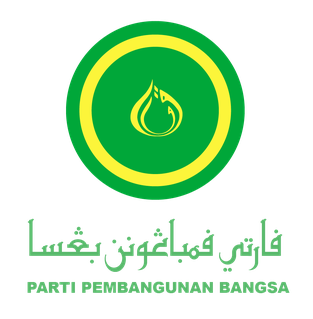
National Development Party is a political party in Brunei. Although legally registered as a political party, it has not been able to gain electoral representation as legislative elections have not been held in Brunei since 1962. The party formally legalised on 31 August 2005 by former rebel and Secretary General of the banned Brunei People's Party, Yassin Affandi, aka Haji Muhammad Yasin bin Abdul Rahman, co-founded the Party, which is the third political party founded legally in Brunei to date.

The Parti Melayu Semangat 46 or Spirit of 46 Malay Party (S46) was a Malaysian political party. The party was formed in 1988, and dissolved in 1996. It was formed by Tengku Razaleigh Hamzah's "Team B" faction of the United Malays National Organisation (UMNO), as a challenge to prime minister Mahathir Mohamad and UMNO.
The politics of Brunei take place in a framework of an absolute monarchy, whereby the Sultan of Brunei is both head of state and head of government. Brunei is the only ruling monarchy in Southeast Asia. As of 2023, Brunei is one of seven monarchic dictatorships in the world.
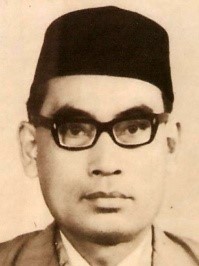
Dato' Seri Dr. Burhanuddin bin Muhammad Nur al-Hilmi, commonly known as Burhanuddin al-Helmy, was a Malaysian politician. He was President of the Malaysian Islamic Party (PAS) from 1956 to his death in October 1969.
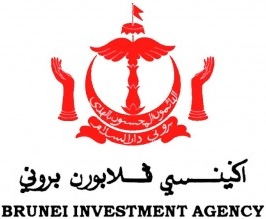
The Brunei Investment Agency (BIA) is a government-owned corporation that reports to the Ministry of Finance of the Government of Brunei. Established in 1983, its offices are located in Bandar Seri Begawan at the Ministry of Finance HQ. Data on the agency's assets are not reported to the public and the Sultan and his assets, to a certain degree, are also incorporated in the agency; however the extent is unknown. In October 2023, the fund has a total of US$73 billion in assets under management.

Hassanal Bolkiah Muiz'zaddin Wad'daulah is Sultan of Brunei since 1967, and prime minister of Brunei since independence from the United Kingdom in 1984. He is one of the few remaining absolute monarchs in the world.

The Ministry of Culture, Youth and Sports, Brunei Darussalam is a ministry in the Government of Brunei Darussalam responsible for the policies and development of the country's national culture, youth, and sports. It was established immediately upon Brunei's independence on 1 January 1984. It is led by a minister, and the incumbent is Nazmi Mohamad who has held office since 7 June 2022. The ministry is headquartered in Bandar Seri Begawan, in the Brunei-Muara District of the sultanate of Brunei Darussalam.

The Istana Darussalam is the former residence of Omar Ali Saifuddien III and birthplace of Sultan of Brunei, Hassanal Bolkiah. The palace is located at Jalan Darussalam, Sumbiling Lama, Brunei-Muara District, Brunei. The building has become a tourist attraction and currently under the protection of the Antiquities and Treasure Trove Act of the Museums Department.

Badaruddin bin Haji Othman, pen name Badaruddin H.O., is a Bruneian aristocrat, politician and diplomat who is the incumbent Minister of Religious Affairs (MoRA) since 2015. He also formerly held the position of Minister of Home Affairs (MoHA) from 2010 to 2015. Within the limited group of political leaders, Pehin Abdul Aziz bin Umar and Pehin Badaruddin were regarded as the two primary proponents of the Melayu Islam Beraja (MIB) philosophy and the heads of the more orthodox Islamic faction.
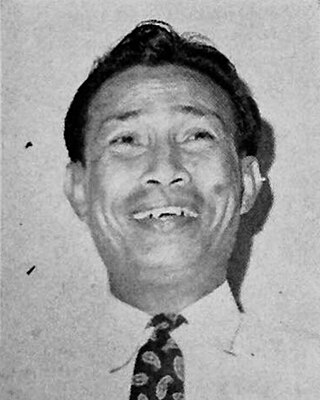
Mohd Salleh bin Haji Masri, pen name H. M. Salleh, was a Bruneian aristocrat, nationalist politician, activist and an experience teacher who was among the founding members of the Brunei Youth Front and Brunei People's Party. Him alongside Yura Halim were considered to be the country's first novelists. He was the initial head of the Brunei Nationalist Movement in the 1940s and 1950s.
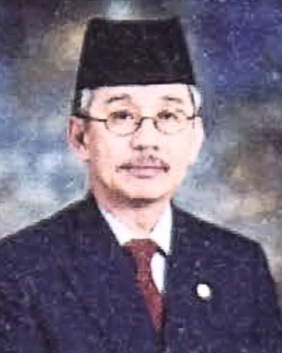
Yakub bin Abu Bakar or also referred to as Dato Yakub, was a politician from Brunei who served as the Deputy Minister of Culture, Youth and Sports between 2005 and 2007, and Deputy Minister of Finance from 2003 to 2004. He was also among the board of directors of Yayasan Sultan Haji Hassanal Bolkiah from 1992 to 1995.

Mahmud Saedon bin Othman was a Bruneian writer and Muslim scholar. His proficiency in the legal and Islamic domains, served as the foundation for the nation's giving of diplomas in law and Syar'ie law. Additionally, he was the principal advocate for the progressive reinstatement of syariah laws as the supreme law of the nation and the Islamic Legal Specialist in the Ministry of Religious Affairs (MORA).

The Sultan Hassanal Bolkiah Institute of Education is a Bruneian research institute and graduate school of education, located at the Tungku campus of the Universiti Brunei Darussalam (UBD). It provides graduate programs with both faculty and a curriculum that aims to improve teaching standards and assist the national educational system.
References
Citations
- ↑ Sidhu 2009, p. 53.
- 1 2 3 4 Lea & Milward 2001, p. 20.
- 1 2 3 4 5 Europa Publications 2002, p. 206.
- 1 2 3 Singh 2009, p. 63.
- ↑ Economist Intelligence Unit 2001, p. 32.
- ↑ Heenan & Lamontagne 2013.
- ↑ Funston 2001, p. 22.
- ↑ Europa Publications 2002, p. 221.
- 1 2 Institute of Southeast Asian Studies 1996, p. 7-8.
- ↑ Singh & Wah 2003, p. 77.
Sources
- Singh, Daljit (2009). Southeast Asian Affairs 2009. Institute of Southeast Asian Studies. ISBN 978-981-230-948-8.
- Singh, Daljit; Wah, Chin Kin (2003). Southeast Asian Affairs 2003. Institute of Southeast Asian Studies. ISBN 978-981-230-217-5.
- Europa Publications (2002). The Far East and Australasia 2003. Psychology Press. ISBN 978-1-85743-133-9.
- Funston, N. John (2001). Government and Politics in Southeast Asia. Institute of Southeast Asian Studies. ISBN 978-981-230-133-8.
- Institute of Southeast Asian Studies (1996). Regional Outlook: Southeast Asia 1996-97. Institute of Southeast Asian Studies. ISBN 978-981-3055-17-9.
- Heenan, Patrick; Lamontagne, Monique (3 April 2013). The Southeast Asia Handbook. Routledge. ISBN 978-1-136-64091-9.
- Economist Intelligence Unit (2001). Country Report: Malaysia, Brunei. The Unit.
- Lea, David; Milward, Colette (2001). A Political Chronology of South-East Asia and Oceania. Psychology Press. ISBN 978-1-85743-117-9.
- Sidhu, Jatswan S. (22 December 2009). Historical Dictionary of Brunei Darussalam. Scarecrow Press. ISBN 978-0-8108-7078-9.